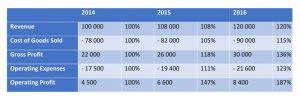
Generally speaking, accountants analyze the financial data gathered by bookkeepers. Unlike standard bookkeeping which is limited to maintaining the books and basic data entry. Going full-charge means all bookkeeping, AR/AP, data systems, tax, and financial statements are prepared by one person. Full-charge bookkeepers can help prepare financial statements and tax returns, which the employer submits to CPA for review or audit. Full-charge bookkeepers usually don’t provide advice on tax planning or try to act as financial advisors. The increasing demand for full charge bookkeepers in small businesses highlights the growing recognition of the importance of maintaining accurate financial records.
- The role is most often found in small to midsize companies that don’t need an accountant or controller.
- Most companies prefer full charge bookkeepers with a combination of education, experience in the field, and advanced accounting software training.
- Their expertise also covers tax planning as they navigate the complexities of tax regulations, ensuring compliance while optimizing efficiency.
- It helps assess the company’s ability to generate and manage cash, which is crucial for its day-to-day operations and long-term sustainability.
- Some employers are willing to hire people who don’t have any previous experience in bookkeeping and instead provide on-the-job training (OJT).
- According to AccountingTools, a full charge bookkeeper job description requires handling the full cycle of accounting duties or supervising others in the basic tasks, such as accounts payable.
Full charge bookkeeper vs. accountant
Generating accurate and timely financial statements is vital for decision-making, financial planning, and complying with legal and regulatory requirements. It requires a strong understanding of accounting principles, attention to detail, and proficiency in accounting software. To reconcile bank statements effectively, you need to carefully review each transaction, match them with corresponding what is a bookkeeper records, and investigate any discrepancies. This process helps to identify any errors in recording transactions, such as duplicate entries or missing transactions. By resolving these discrepancies, you ensure that the company’s financial records accurately reflect its true financial position. Reconciling bank statements is another important duty of a full charge bookkeeper.
Beverley Howard Obituary – CA – Woodland Daily Democrat
Beverley Howard Obituary – CA.
Posted: Wed, 29 May 2024 11:29:10 GMT [source]
Duties & Responsibilities for an Accounting Clerk in a Firm
To become a bookkeeper, a high school diploma or equivalent and some basic bookkeeping knowledge are enough. However, knowing that there are various types of bookkeeping methods and lots of math and calculation involved, a bookkeeper should have math, data entry, and computer skills. No matter how much bookkeeping and accounting duties might differ, a full service bookkeeping job combines some features of both. However, as your business appetites grow and your company scales, you might ask yourself whether this role should be taken to a higher level as well. ” question and explain the job’s duties, responsibilities, educational requirements, and more. Forecasting financial trajectories, sculpting budgets, and devising strategic blueprints for financial optimization rests within the purview of accountants.
DIY Software
A full charge bookkeeper with certification can help you with recording transactions, processing accounts payable, managing payroll, and doing taxes. When needed, you can hire a certified public accountant to coordinate with an FC bookkeeper and help with audits and tax returns. The full-charge bookkeeper job description goes beyond the usual responsibilities that typical bookkeepers have.
A. Make General Ledger Adjustments:
Most companies prefer that full charge bookkeepers combine advanced education or certification with experience in the field. Advanced accounting software training and experience is also helpful for job seekers. Therefore, a full-charge bookkeeper can handle many different things concerning finances.
Previous PostWhat Are CFO Services And How CFOs Steer Businesses

It’s a cost-effective solution for small businesses or those experiencing rapid growth. While a full charge bookkeeper and an accountant work closely with financial data, they serve divergent roles in an organization. These distinctions become apparent when we delve into their responsibilities, education, and contribution to strategic decision-making. Small business owners are typically experts in their field or industry but might need more financial expertise to keep their company’s books in order. They don’t just crunch numbers; they make those numbers understandable and usable for the business owner.
Increasing Demand in Small Businesses

This position fills a particular talent gap as a result of a small business’s growth. Most smaller businesses work with their own in-house teams or outsourced bookkeepers until they reach a certain size. At that point, they usually add high-level roles like controllers or CPAs full-time.
Depending on your company’s size, the way it’s structured, and the level of expertise required, you might decide whether you need to hire a regular or full charge bookkeeper. Your business would benefit from a full charge bookkeeper if it’s scaling and you can’t handle managing the books and performing full-cycle accounting tasks. https://www.bookstime.com/ What is the full charge bookkeeper’s role in comparison to an accountant’s, then? Although FC bookkeepers do provide accounting services, they usually don’t act as financial advisors or deal with auditing and tax reports. Full charge bookkeepers usually seek external assistance from a certified public accountant or a controller.
- They code and enter vendor and expense invoices, run checks, bill customers and clients, and prepare bank deposits, ensuring that the correct general ledger accounts are debited or credited accordingly.
- This includes managing everything from day-to-day financial transactions to preparing detailed financial statements and overseeing tax preparations.
- Obtaining professional certifications is a way to showcase your expertise and commitment to the field of bookkeeping.
- US institutions that can provide these include the American Institute of Professional Bookkeepers, the National Association of Certified Public Bookkeepers, and other educational or career institutions.






